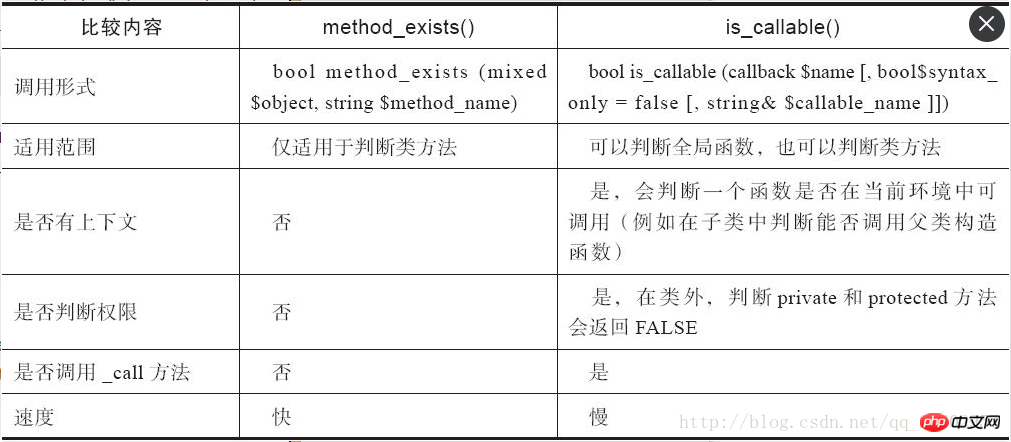Home >Backend Development >PHP Tutorial >Introduction to the specific differences between is_callable() and method_exists() functions in php
Introduction to the specific differences between is_callable() and method_exists() functions in php
- 黄舟Original
- 2017-08-10 11:23:061431browse
In many product applications, we can often see the following usage, which is used to check whether a method in an object exists.
<?phpif (method_exists($object, 'SomeMethod')) {
$object->SomeMethod($this, TRUE);
}?>The purpose of this code is relatively easy to understand. There is an object called $object. We want to know whether it has a method called SomeMethod. If so, call this method.
This code looks correct and will run fine most of the time. But if the method of this $object object is invisible to the current running environment, can the program still run normally? Just as this function name method exists, it just checks whether the class or object we provide has the method we expect. If so, it returns TRUE. If not, it returns FALSE. The issue of visibility is not considered here. Therefore, when you happen to determine a private or protected method, you can get a correct return, but when executing, you will get a "Fatal Error" error warning.
The real intention of the above code should be understood as: for the provided class or object, can we call its SomeMethod method in the current scope. And this is the purpose of the is_callable() function. is_callable()The function receives a callback parameter, which can specify a function name or an array containing method names and objects. If it can be executed in the current scope, it returns TRUE.
<?phpif (is_callable(array($object, 'SomeMethod'))) {
$object->SomeMethod($this, TRUE);
}?>Let’s give an example to illustrate the difference between the two
<?phpclass Foo {
public function PublicMethod(){}
private function PrivateMethod(){}
public static function PublicStaticMethod(){}
private static function PrivateStaticMethod(){}
}$foo = new Foo();$callbacks = array(
array($foo, 'PublicMethod'),
array($foo, 'PrivateMethod'),
array($foo, 'PublicStaticMethod'),
array($foo, 'PrivateStaticMethod'),
array('Foo', 'PublicMethod'),
array('Foo', 'PrivateMethod'),
array('Foo', 'PublicStaticMethod'),
array('Foo', 'PrivateStaticMethod'),
);foreach ($callbacks as $callback){
var_dump($callback);
var_dump(method_exists($callback[0], $callback[1]));
var_dump(is_callable($callback));
echo str_repeat('-', 10);
echo '<br />';
}After executing the above script, we will clearly see the difference between the two functions.
is_callable()There are other uses, for example, not checking the provided class or method, but only checking whether the syntax of the function or method is correct. Like method_exists(), is_callable() can trigger automatic loading of classes.
If an object has a magic method __call, method_exists() will return FALSE when judging the method, and is_callable() will return TRUE.
<?phpclass MethodTest {
public function __call($name, $arguments){
echo 'Calling object method ' . $name . ' ' .implode(', ', $arguments); echo '<br />';
}
}$obj = new MethodTest();$obj->runtest('in object context');
var_dump(method_exists($obj,'runtest'));
var_dump(is_callable(array($obj,'runtest')));echo '<br />';Running result
Calling object method runtest in object context
bool(false) bool(true)

The above is the detailed content of Introduction to the specific differences between is_callable() and method_exists() functions in php. For more information, please follow other related articles on the PHP Chinese website!

